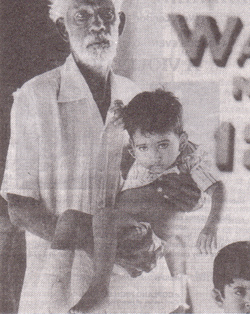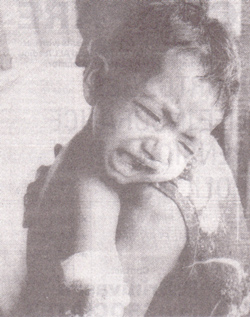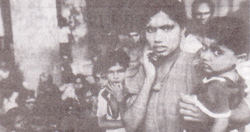TWO HARROWING WEEKS IN JAFFNA -
JAFFNA, SEPTEMBER/ OCTOBER 1987
- An Eye Witness Account, Dr. Ramani
Chelliah,
15 October 1987, Tamil Times
"...we who have been reduced
to a people who are no longer able to bury our
dead, do not even know now who is alive and who
is dead..."
The Indo - Sri Lankan Peace Accord of July
1987 meant for me that I could make my
long-awaited trip back to Jaffna to visit my
parents and all my folks.
I arrived in a calm and peaceful Jaffna on
September 25, 1987. Thileepan's fast was on,
protesting the failure of implementation of the
Accord. the continuing accelerated colonisation
programme being carried out by the Sri Lankan
Government and the delay in setting up the
interim Government. His subsequent martyrdom on
September 20 1987 had a profoundly emotional
impact on everyone and tears of real anguish
flossed freely. In spite of this and in spite of
recognising political difficulties ahead. there
was a general air of confident stability.
After years of living under war conditions
peace had brought about great optimism.
Delegations from foreign aid organisations had
been visiting Jaffna. tourists Were in the
hotels, surveyors were sighted measuring up to
rebuild Jaffna town. We were to become like
Singapore. so the story went.
On Saturday 10 October, I was in Urumpirai
visiting my in laws taking lots of photographs
and haying a very pleasant time. Distant rumbling
noises were heard in the earls afternoon but we
simply dismissed it. My father who was to have
collected me in the evening to take me back home
to Nallur turned up by mid afternoon with the
news that there was shelling near the Fort and a
curfew had been declared. It wasn't taken too
seriously but not wanting to take any chances we
returned to Nallur early. It was probably just a
bit of trouble near the Fort as usual. but
nothing to worry about we thought. After all we
had not only the Peace Accord but the mighty
Indian Peacekeeping Force itself to guarantee
peace. No harm could possibly come.
|

A Tamil Father in Jaffna
tries to comfort his wounded
child
|
|

A Tamil Boy whose arm
was amputated during IPKF attack on
Jaffna
|
|

Displaced Tamils seeking
refuge in an old Church
|
The next day shells began to rain down. The
Indian army was shelling Jaffna. It was on our
houses and on our heads that these shells were
falling. There was shocked disbelief. It could
not be possible. It could not be the Indian
Peacekeeping Force who had been welcomed into our
land with flowers. garlands and prayers.
The noise was deafening. All at home huddled
together in a small part of the house which had a
concrete roof under the fragile belief that it
afforded marginally more protection than a tiled
roof.
We learned the next day that at least fourteen
people had died during the course of that evening
alone in the immediate vicinity of our house. and
around Pillaiyar Kovil which itself had taken
about seven direct hits causing massive
destruction. The headless trunks of a woman and a
young girl had been sighted by a relative coming
to see if we were all right.
Later people in the neighbourhood had to he
brought in to identify the two from
their clothing. In one house a family of six
had been killed instantly and in another four
people from a family had died. The list of
injuries was long. An apothecary. a kind and
helpful man to whom everyone went had lost a leg.
A teachers wife young woman had lost an arm. An
old. blind diabetic man had shrapnel wounds on
his hack which had swollen up grotesquely. A few
people who had taken shelter by a brick wall had
their bodies sprayed and splattered across the
broken wall.
The curfew and fear and lack of transport
precluded all talk of funerals. Those who were
lucky were bundled up in sacks and dumped in the
hospital morgue. For others where there were long
delays before being cleaned up. Crows were
sighted on trees eating human flesh.
That was the beginning of the Indian invasion.
From the time the shelling started till the time
I escaped out of Jaffna on 2 October, it didn't
stop. Day and night every day during those twelve
days, I lived with the possibility of being blown
to smithereens. My only wish was as for a quick
death if it had to be rather than a slow and
agonising one through injury - the Jaffna
hospital was closed. There was no transport
anyway and there would have been no bandages
even, let alone medicines.
My other and equally great fear was to have
someone near and dear to me splattered across my
lap.
We lived in total isolation because of the
curfew and lack of movement. not knowing what was
happening three miles down the road. No place
within Jaffna was a safe place to escape to. The
three designated refugee points (the Nallur
Kovil, Hindu College and Hindu Ladies College)
were filled to overflowing and people were
fighting for standing space. At these places
diseases were spreading in the filth and squalor
and babies were dying of dysentery. Food supplies
were running very low.
Surviving the shelling and the helicopter
gunships and the bombing was one thing - facing
the Indian troops after they got in was another.
Isolated as we were we simply did not know what
they would do once they actually came into our
area. I left before that happened in Nallur.
In Colombo I found out about the point-blank
machine gunning that had taken place at
Urumpirai. Relatives I had been with and
photographed on the day the shelling had started
had been shot dead in cold blood by the Indian
army some days later. Among them was a 72
year-old woman who had gone to open the door to
let them in.
It is now over three weeks since India
embarked on its military offensive against
innocent civilians and yet the entire Northern
province is totally sealed off, with no
information coming out. They are said to be in
control, the militant resistance has retired into
the jungles and yet every escape route out of the
North has been sealed. It can only mean one
thing.
In the absence of outside observers and free
flow of information India is carrying out large
scale massacres of our people under the guise of
mopping up of resistance. It is outright
genocide. And we who have been reduced to a
people who are no longer able to bury our dead,
do not even know now who is alive and who is
dead.
|